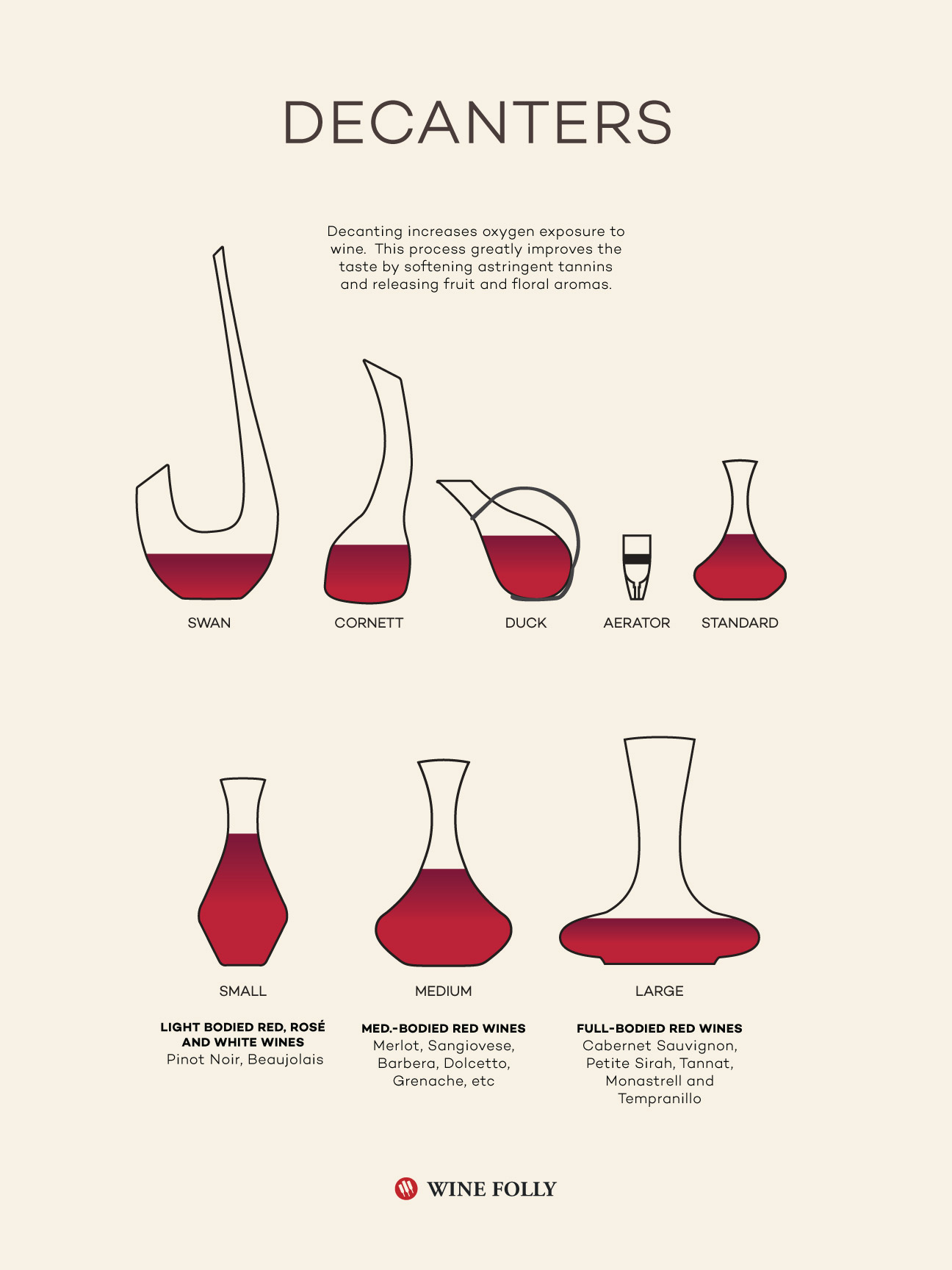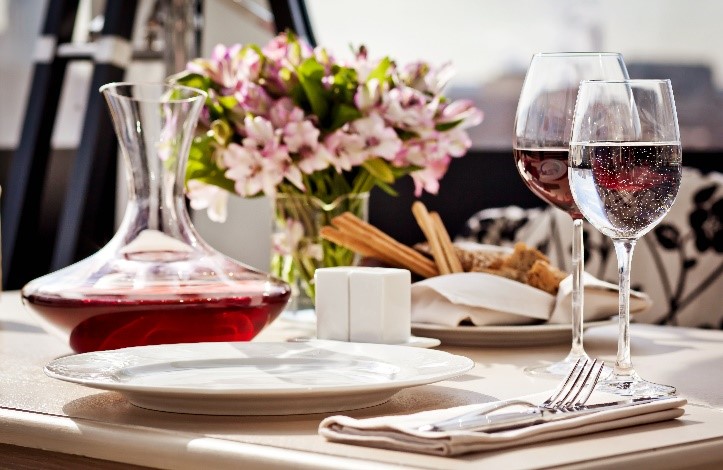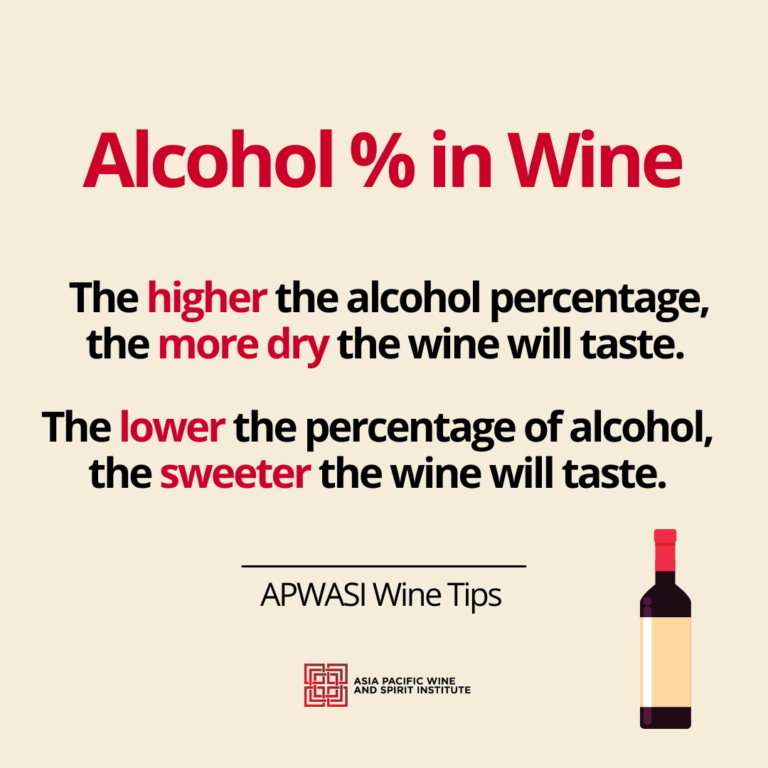What is decanting wine and how do you properly store the wine?
Defining Decanting
According to the Cambridge English dictionary decanting means “pouring a liquid from one container to another.” In the case of liquid, it is the wine, the first container is the wine bottle and the pouring into another container refers to the decanter.
Advice #1: Buy yourself a decent decanter
There are many styles but having a “standard” decanter in 3 different sizes is most useful.

- The small decanter for light bodied red like a pinot noir, rose and white wines.
- The medium decanter for medium bodies red wines like a merlot.
- The large decanter for full bodied reds like a Syrah.
There are many styles like a cornett, sawn, but for the moment let us stay with the standard decanter.
Now that you have the equipment, why do we decant wine?
There are two types of red wine in terms of age, old and young. Not every wine needs to be decanted though.
With older red wines there can often be sediment in the bottle which if poured into the glass can make the wine more astringent, not to mention rather unsightly. So, decanting the wine would be the solution because the decanting process separates the wine from the sediment. Slowly and carefully decanting the wine ensures that the sediment stays in the bottle and the wine poured into the glass is then clear and appealing.
Another reason we decant, is to aerate the wine. As mentioned before there are in terms of age, old and young wines. Young red wines normally less than 5 years old can be tight or closed when it comes to the aroma on the nose or tasting on the palate. By pouring the wine into the decanter in a slow and methodical manner the wine takes in and absorbs oxygen and this in turn assists in revealing greater aromatic notes and flavor profiles of the wine. Wines such as Cabernet Sauvignon, and Syrah would be a clear example of aerating older wines to enhance flavor and remove sediment.
Many a time, we are enticed and enthused to share a wine that is too young to drink now and ought to be drunk in the future. Should we feel compelled to open a wine that would be more pleasing in a few years time, then decanting will assist in up-lifting the aroma and flavor. Why? Because aerating the wine allows more oxygen to integrate with the wine and exposing the wine through decanting increases aeration.
Remember, the older the wine, the shorter the decanting time and the younger the wine the longer the decanting period before actually drinking the wine.
Before we decide to decant, we need to ensure the wine is correctly stored. Let’s explore that area of the wine process – storing wine.
How to store wine
It is important to follow certain rules:
- Store wine at a proper temperature. Generally, around 13ºC is a comfortable temperature.
- The temperature needs to be constant and not fluctuate. Fluctuations cause decreased elasticity of the cork which is fatal as a dried-out cork can permit seepage of air into the wine.
- If wine is stored in temperature around -4ºC it can cause the wine to freeze.
- If wine is kept above 20°C it can dry the cork out rapidly and that would allow air to penetrate into the bottle and speed up oxidation of the wine.
- Store wine bottles horizontally this keeps the wine in contact with the cork and thus keeps the cork moist and prevents premature drying of the cork.
- Keeping wine horizontally for wines with a screwcap is not necessary.
- Keep the wine away from UV light as this tends to speed up the breakdown of the wine’s flavors and aromas.
- If you use a fridge use a wine fridge not a fridge that we use to keep our vegetables and meat in. The latter does not have suppressors like wine fridges. Suppressors reduce the vibrations and if you store a wine in a normal fridge the vibrations over months and years cause early oxidation.
- Ensure you store the wine at a constant humidity. Fluctuations impact the wine’s longevity. Why? Because at lower humidity levels corks can dry out rapidly and oxygen can seep in and with higher humidity wine labels tend to peel off the bottles thus making them appealing when displaying or selling the wine.
- Humidity should be between 60 and 68 percent.
One final word of advice offered relates to a question that many ask, “How do you store open bottles of wine that are not finished?”
- If stored properly, an opened bottle of wine is still drinkable up to 3-5 days.
- The solution is to re-cork the wine swiftly after opening and closing the wine when pouring.
- If any wine is left in the bottle you can use a spray can filled with argon gas which is heavier than air. The gas will tend to remain at the bottom of the wine bottle protecting the wine from the air, a barrier is created between the wine and the air.
- Another is to vacuum pump the air out using a wine vacuum pump to remove excess air out of the bottle and the special air seal that prevents air entering creating an airtight seal.
BONUS: Decanting white wine or sparkling wine – yes or no?
The short answer is no. There is no sediment with white wines and white wines tend to pass their peak after 4- 5 years from bottling. Sparkling wine is unique because of the bubbles. By decanting the sparkling wine all you are doing is dissipating this lovely experience of bubbles on the palate as decanting reduces the bubbles present. Could you? Yes, you could. Would it be advised? I say no.
We wish you great adventures in your wine tasting and remember good habits keep the wine you cherish longer and keeps that valuable asset in good condition and decanting wine gives you a preferred method to present the wine and enhance the experience and flavor.




